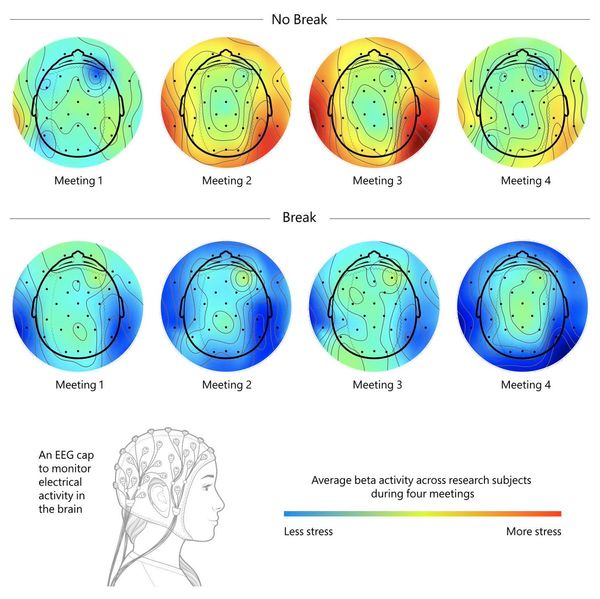Table of contents
Reading time < 5 minutes
The Management Summary
Back-to-back virtual meetings have become stressful, causing the so-called "meeting fatigue" during remote work. Well, this is certainly not a surprise.
But what actually is a surprise is that according to research by Microsoft’s Human Factors Engineering group, taking short breaks can prevent the meeting fatigue (more information here and here).
The research found that short breaks between meetings reduce stress and allow the brain to “reset.” The study, which measured electrical activity in participants’ brains using an electroencephalogram (EEG) cap, also found that breaks improve the ability to focus and engage during meetings.
Microsoft's Human Factors Lab studied 14 participants across two days of video meetings:
- Day 1: 4 back-to-back 30-min meetings.
- Day 2: 4 30-min meetings with 10-min breaks in between.
To help workers take short breaks, Microsoft Outlook and Google Workplace Gmail individual users can set scheduling defaults that shorten meetings, or organizations can set scheduling defaults for everyone.
A detailed description of the study
This brain study is based on a recent more expansive study by hundreds of researchers at Microsoft, who investigated the change of work accelerated by the Covid-19 pandemic, creating a large body of research related to remote and hybrid work.
You can download the study below:
I will break down the results of the brain study related to virtual meetings into three main takeaways:
- The impact of back-to-back meetings on stress
- The impact of small breaks on performance
- What you can do as a manager for your team
So, let’s start:
Takeaway 1: Back-to-Back Meetings Promote Stress
Back-to-back meetings create an accumulating buildup of stress in the brain. Anticipation of transitions caused further spikes. Short breaks in between meetings allowed the brain to reset and never experience stress buildup:
Takeaway 2: Breaks Promote Performance
Back-to-back meetings resulted in negative levels of frontal alpha symmetry, a brain state connected to lower levels of engagement. In contrast, short breaks between meetings resulted in positive levels, meaning participants performed better.
The answer seems to be that short breaks between meetings are having the following positive impacts:
- They eliminate stress buildup, while
- improving focus and therefore performance, and
- reduce the impact of attention fatigue
So, to summarize:
- Back-to-back meetings are harming mental health and work performance.
- Hence, schedule short breaks to allow a reset and improve performance.
My personal Takeaways
During a very intense project phase back in 2021, I participated in > 8 back-to-back meetings every single day and I told myself: never again. It created such a high-stress level because I was not even able to get a glass of water. It drained me of my energy and discipline about the healthy hobbies unrelated to work; the only thing pushing me forward was the adrenaline from the stress.
Apart from this, I will actually take this study to heart and start implementing 25-minute meetings via Google Workspace’s integrated function to automate getting the benefits of small breaks.
Additionally, I have a few theories. It could also be a chance to review the kinds of meetings you participate in.
Meetings to discuss meetings are where companies are wasting their resources.
From my experience, most of the scheduled meetings could be avoided if the people sending the invite would be more precise about what they wanted. Usually, I receive empty invites with a generic name like “Alignment on «project name»”. No idea what the sender wants. Hence, I am not able to prepare and the meetings are about discussing what kind of meeting would be needed to be set up. Wasted time, but unfortunately the norm.
I have personally found that the best way to enforce less than 20-minute meetings is:
- Keep the group of participants small and specifically avoid the people asking irrelevant questions
- Have a prepared document ready where you wrote down the points you would like to discuss while noting the outcomes of the discussed points (to review them but also to share them with others)
- If you are the invited person, ask in the beginning before the chit chat “What can I do for you?” so you can find out quickly if the other person really has a specific point or is just connecting because they don’t know what to do next
- If you set the tone to dive in and stay focused, there are few things that take more than 15 minutes
I stand while having a virtual meeting.
Office desks that allow you to stand are already a must-have for everybody working from home. Several studies (here here and here) have shown that standing is neither increases nor decreases cognitive performance, some are showing health improvements but more importantly, the studies show a feeling of discomfort after standing for some time.
Therefore, I like to stand during my virtual meetings because I imagine that my brain is automatically trying to end the meeting to be able to sit down again. If you do it with a group of people in person, I bet that people are having the same intuition which can lead to shorter meetings.
I try to take a walk at least once during my workday.
When studying the effects of a walk before tasks on the cognitive performance of a group of children, reading comprehension was significantly better after exercise. Spelling and arithmetic were modestly better. Movement is sacred - for children and adults alike.
This is one of the reasons I like to pay more rent to live nearer to where I work; instead of using a vehicle to get to work, I have the privilege to walk 10-15 min every morning to and every evening from work. In addition, I try to take another walk in the afternoon around 3-4 pm, getting some fresh air and just thinking.
Your turn
What are your tips on avoiding not only many but also long meetings?
